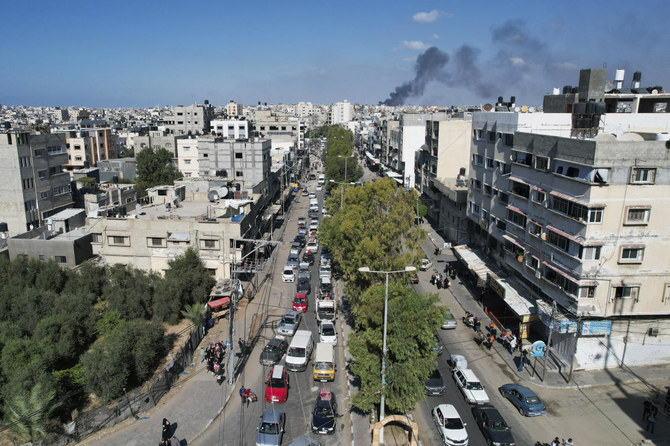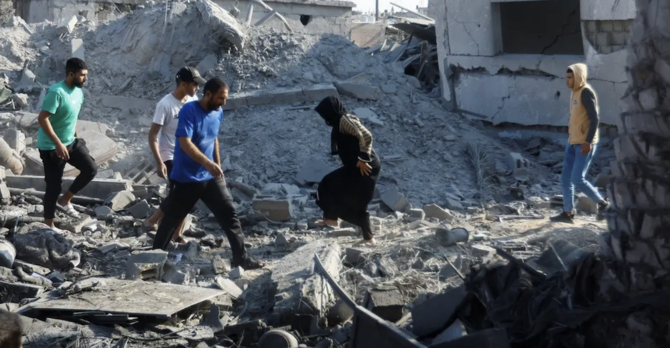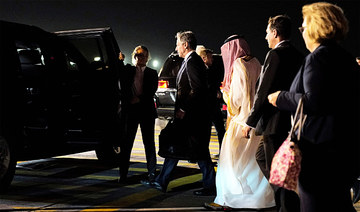DEIR AL-BALAH, Gaza Strip: Desperate Palestinians scrambled for escape from northern Gaza on Saturday or huddled by the thousands at a hospital in the target zone in hopes it would be spared, as Israel intensified warnings of an imminent offensive by air, ground and sea following Hamas militants’ deadly rampage in Israel a week ago.
While workers at an Israeli military base continued efforts through the Jewish Sabbath to identify the more than 1,300 people killed in the Oct. 7 assault, Israel dropped leaflets from the air and redoubled warnings on social media for more than 1 million Gaza residents to move south.
The military says it is trying to clear away civilians ahead of a concentrated campaign against Hamas militants in the north, including in what it said were underground hideouts in Gaza City. Hamas urged people to stay in their homes.
The UN and aid groups say such a rapid exodus along with Israel’s siege of the territory would cause untold human suffering. The World Health Organization said the evacuation “could be tantamount to a death sentence” for the more than 2,000 patients in northern hospitals, including newborns in incubators and people in intensive care.

Gaza’s humanitarian crisis already was mounting Saturday amid a growing shortage of water and medical supplies under a week-old Israeli blockade, which has also forced electrical plants to shut down without fuel.
In Gaza City, Haifa Khamis Al-Shourafa crowded into a car with six family members, fleeing to the south in the darkness.
“We don’t deserve this,” Shourafa said, before leaving her home city. “We didn’t kill anyone.”
The evacuation directive covers an area of 1.1 million residents, or about half the territory’s population. The Israeli military said “hundreds of thousands” of Palestinians had heeded the warning and headed south. It gave Palestinians a six-hour window that ended Saturday afternoon to travel safely within Gaza along two main routes.
In Israel, meanwhile, workers at a miIitary base received special rabbinical approval to continue identifying bodies of the more than 1,300 people, most civilians, killed by Hamas. Work is normally halted on Saturday, the Jewish Sabbath.
Prime Minister Benjamin Netanyahu visited Be’eri and Kfar Azza, two southern border communities where Hamas militants slaughtered dozens of Israelis, to meet with soldiers and tour the ruins of bloodied homes. Netanyahu has faced criticism that his government has not done enough to meet with relatives of the victims.
Hundreds of relatives of the scores of Israelis and foreigners captured by Hamas and taken to Gaza gathered outside the Israeli Defense Ministry in Tel Aviv, demanding their release.
“This is my cry out to the world: Please help bring my family, my wife and three kids,” said Avihai Brodtz of Kfar Azza. Many expressed anger toward the government, saying they still have no information about their loved ones.
In a nationally broadcast address Saturday night, Israel’s chief military spokesman, Rear Adm. Daniel Hagari, accused Hamas of trying to use civilians as human shields and issued a new appeal to Gaza residents to move south.
“We are going to attack Gaza City very broadly soon,” he said, without giving a timetable for the attack against the 40-kilometer-long (25-mile-long) territory.
“The Palestinian civilians in Gaza are not our enemies,” an Israeli military spokesman, John Conricus, said. “We don’t assess them as such, and we don’t target them as such. We are trying to do the right thing.”
Israel has called up some 360,000 military reserves and massed troops and tanks along the border with Gaza. US Defense Secretary Lloyd Austin said late Saturday that the US was moving in a second carrier strike group, the USS Dwight D. Eisenhower, as a deterrence to any regional actors seeking to widen the war.
Palestinian militants have fired more than 5,500 rockets into Israel since the fighting erupted, the Israeli military said.
Hamas remained defiant. In a televised speech Saturday, Ismail Haniyeh, a top official, said that “all the massacres” will not break the Palestinian people.
Fighting continued in the run-up to the expected offensive, with Hamas launching rockets into Israel and Israel carrying out strikes in Gaza.
An Israeli airstrike near the Jabaliya refugee camp in northern Gaza killed at least 27 people and wounded another 80, Gaza health authorities said.

Most of the victims were women and children, the authorities said. Doctors from Kamal Edwan Hospital shared chaotic footage of charred and disfigured bodies.
It was not clear how many Palestinians remained in northern Gaza by Saturday afternoon, said Juliette Touma, a spokesperson for the UN agency for Palestinian refugees. An estimated 1 million people have been displaced in Gaza in one week, she said.
At Gaza City’s main hospital, Al-Shifa, a crowd of men, women and children that medical officials estimated at 35,000 crammed into bloodied hallways and on hospital grounds, sitting under trees as well as inside the building’s lobby, hoping to be protected from the fighting.
“People think this is the only safe space after their homes were destroyed and they were forced to flee,” said Dr. Medhat Abbas, a Health Ministry official.
Basic necessities like food, fuel and drinking water were running out because of the complete Israeli siege.
Water has stopped coming out of taps across the territory. Amal Abu Yahia, a 25-year-old pregnant mother in the Jabaliya refugee camp, said she waited anxiously for the few minutes when contaminated water trickles from the pipes in her basement. She rations it, prioritizing her 5-year-old son and 3-year-old daughter. She said she is drinking so little herself, she only urinates every other day.
Near the coast, the only tap water is contaminated with Mediterranean Sea water because of the lack of sanitation facilities. Mohammed Ibrahim, 28, said his neighbors in Gaza City have taken to drinking the salt water.
The Israeli military’s evacuation order demands the territory’s entire population cram into the southern half of Gaza as Israel continues strikes, including in the south.
Rami Swailem said he and at least five families in his building decided to stay put in his apartment near Gaza City. “We are rooted in our lands,” he said. “We prefer to die in dignity and face our destiny.”
Others were looking desperately for ways to evacuate. “We need a number for drivers from Gaza to the south, it is necessary #help,” read a post on social media.
The UN refugee agency for Palestinians expressed concern for those who could not leave, “particularly pregnant women, children, older persons and persons with disabilities,” saying they must be protected. The agency also called for Israel to not target civilians, hospitals, schools, clinics and UN locations.
Al-Shifa hospital was receiving hundreds of wounded every hour and had used up 95 percent of its medical supplies, hospital director Mohammad Abu Selim said. Water is scarce and the fuel powering its generators is dwindling.
“The situation inside the hospital is miserable in every sense of the word,” he said. “The operating rooms don’t stop.”
Thousands of people crammed into UN-run schools across Gaza.
“I came here with my children. We slept on the ground. We don’t have a mattress, or clothes,” said Howeida Al-Zaaneen, 63, from the northern town of Beit Hanoun. “I want to go back to my home, even if it is destroyed.”
The Gaza Health Ministry said Saturday that over 2,200 people have been killed in the territory, including 724 children and 458 women. The Hamas communications office said Israel has destroyed over 7,000 housing units so far.
At Gaza’s Rafah crossing into Egypt, announcement of an agreement to briefly open the closed crossing to allow foreigners to escape brought hopeful crowds to the gates Saturday. But any deal appeared to have fallen through, with the crossing yet to open by nightfall.
Some 1,500 people in Gaza are estimated to hold Western passports, including about 500 Americans, along with citizens from other parts of the world.
A ground assault in densely populated Gaza would likely bring even higher casualties on both sides in brutal house-to-house fighting.
US Secretary of State Antony Blinken met with Saudi Foreign Minister Faisal bin Farhan in Riyadh on Saturday, and both called for Israel to protect civilians in Gaza.
“As Israel pursues its legitimate right to defend its people and to trying to ensure that this never happens again, it is vitally important that all of us look out for civilians,” Blinken said.
Israel’s raids into Gaza on Friday were the first acknowledgment that Israeli troops had entered the territory since the military began its round-the-clock bombardment in retaliation for the Hamas massacre. Palestinian militants have fired more than 5,500 rockets into Israel since the fighting erupted, the Israeli military said.
Israel has called up some 360,000 military reserves and massed troops and tanks along the border with Gaza. A ground assault in densely populated Gaza would likely bring even higher casualties on both sides in brutal house-to-house fighting.
Hamas said Israel’s airstrikes killed 22 hostages, including foreigners. It did not provide their nationalities. The Israeli military denied the claim. Hamas and other Palestinian militants hope to trade the hostages for thousands of Palestinians held in Israeli prisons.
In the occupied West Bank, the Palestinian Health Ministry says 53 Palestinians have been killed since the start of the war, including 16 on Friday. The UN says attacks by Israeli settlers have surged there since the Hamas assault.
The US and Israel’s other allies have pledged ironclad support for the war on Hamas. The European Union’s foreign policy chief, however, said Saturday that the Israeli military needed to give people more time to leave northern Gaza.
“You cannot move such a volume of people in (a) short period of time,” Josep Borrell said.

























